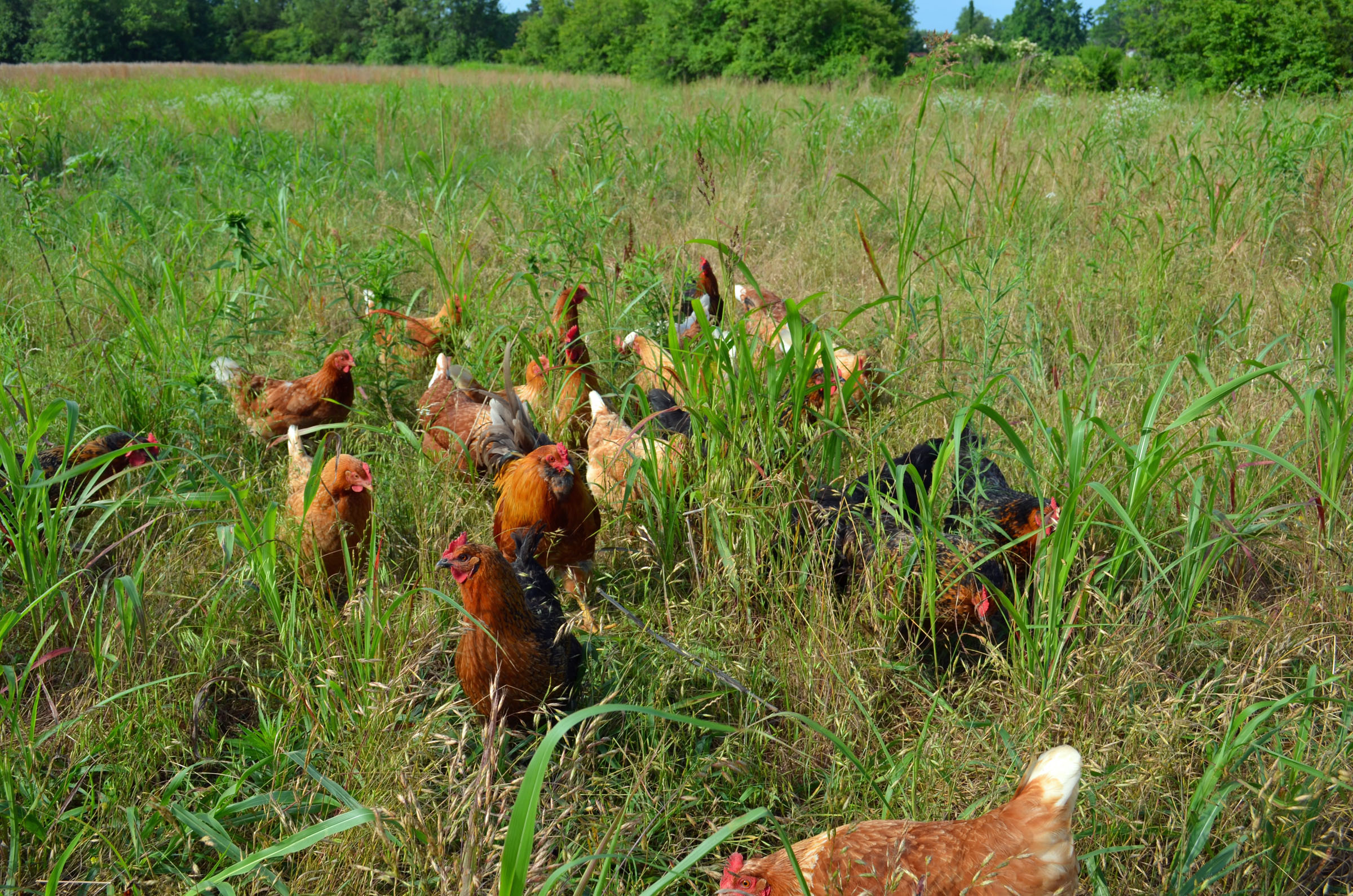
It’s crisp; it’s delicious; it’s nutritious — it’s locally grown food. It’s unequaled in freshness, because what’s purchased from a local farmer was likely harvested that very day, or the day before. It’s an education about where our food originates, and a lesson about the bounty of each season. It’s enjoying food at the peak of its flavor, and it’s literally experiencing a taste of the region.
The Backbone of the South
Farming is the backbone of the South and a large part of the landscape of our lives. Many small farms have been operating for generations, but new farms are emerging, run by people who have left the area, and are now returning, or by “transplants” from other parts of the country who are dedicated to farming on a small scale. Josephine and Randy Alexander are two such transplants, who are successfully running Tubby Creek Farm.
As I approach the farm, Randy drives his motorized wheelchair down the dusty drive to greet me, accompanied by two adopted stray dogs, and a wild bunny that he doesn’t even notice. The Alexanders are good stewards of their land, and they have provided a welcoming environment, not only for their own livestock, but for wildlife in general. Throughout my visit, birds are happily chirping, accompanied by hens clucking, pigs oinking and goats bleating — most roaming freely, in harmony with nature.

An unusually cool, breezy summer morning provides ideal conditions for learning about the Tubby Creek Farm origin and its mission. While waiting for Jo to come in from the field, Randy gives me a brief sketch of what landed them in Ashland, Mississippi, raising animals and growing vegetables.
By the time the couple met, they had both already undergone the culture shock of moving to the Deep South from an entirely different social and environmental climate. Jo, a Maine native, came to Memphis to work for Grow Memphis, http://growmemphis.org. Randy, who originally came to the city as a radio disc jockey, was on the board for the Peace and Justice Center, and was working at the Memphis Center for Independent Living https://sites.google.com/site/mcilaction. Much of the focus for MCIL was in community and neighborhood organization, which threw the two together. They began gardening in their Mid-Town Memphis back yard, and were part of a larger community gardening program. Jo had interned on organic farms in the Minneapolis area, and had an innate sense and love of gardening.
The decision to raise Certified Naturally Grown vegetables and animals was not one they made lightly, but they knew that if they did it, they’d have to go “all in.” “Jo really wanted to do it, and I began to understand the importance of it above some of the social programs I was already doing.” 70 acres of land was purchased in 2011, and for the first year they drove down to the farm and worked it every Sunday, eventually quitting their jobs in January of 2012, to join “an amazing community of Certified Naturally Grown farms in Mississippi.” They actually began their CSA program (Community Supported Agriculture http://www.localharvest.org/csa ) that spring.

Jo rumbles up in the dusty truck at about 8:00 a.m., exiting it with several trays of just harvested cabbages and fingerling potatoes. Dumping the vegetables into the wash basins for their first rinsing, she explains that they have spent most of their time getting their systems down, basically learning on the job through trial and error, and by doing extensive research. With a degree in geology, she is comfortable with scientific lingo, and loves “figuring stuff out.” Farming provides her with plenty of opportunities to do that.
Even with his disability, Randy and Jo do all of the work, assisted by one intern. They work diligently, with little monetary reward, doing something to which they are both committed, and about which they are passionate. Jo does most of the planting and Randy does the cleaning and packing. Randy has been paralyzed from the chest down since 1992, but a lift enables him to mount the handicap accessible tractor, a piece of machinery currently out of commission and covered with clucking chickens on the day of my visit.

The animals add enormously to sustainability, and to the quality of life. In addition to providing manure, the pigs help control invasive species, such as kudzu, and the guineas also eat ticks. Unused vegetables are fed to the pigs and chickens, which helps eliminate waste. Their animals are given very little treated grain, but eat what’s in front of them and are moved around so that they can forage. The food isn’t brought to them, but rather they are brought to the food. Land that is unsuitable for farming, is perfect for grazing. With the exception of the chickens, most of the animals are contained to certain pastures, but are still allowed to roam freely. All of the animals are treated with utmost respect and kindness, even though they will eventually be processed for food. A couple have nick-names, due to unusual markings, but most are not named because of their ultimate fate.
Well over 30 different kinds of vegetables are grown at Tubby Creek, with over 100 varieties. A few varieties are less common, for example Scapes, which are the flower shoot of garlic, or green garlic. Jo suggested sautéing them in lard—yes, lard—a product which she highly endorses! She thinks animal and saturated fat gets a bad rap! “There are lots of reasons to use lard. It’s local, olive oil isn’t. It’s much more stable under high heat. Olive oil and a lot of vegetable oils cooked at high heat start to break down, producing free radicals, so you have to get anti-oxidants to get rid of those,” she explains.

My brief visit provided a vivid reminder of the value of eating locally raised food, but also of the necessity of rearranging our thought processes about what we eat, and when we eat it. “We as a society have come so far away from eating with the seasons,” Jo continues. “We walk into a grocery store, and can get pretty much anything, any time of the year. So most people don’t even really know when things should be in season. As soon as the first warm spring day hits, people are looking for tomatoes. So it’s a really big adjustment for most folks to buy strictly what’s in season. One of the biggest examples of that is: by the time the tomatoes come in, the lettuce is gone, which kind of messes with your salads and your BLTs. In the fall you get some overlap between the lettuces and the tomatoes. But in the South, that’s just the reality.”
When I asked if they thought it was conceivable that there would be a time when there was wide spread small scale farming to meet world needs, their deeply felt conviction was ignited.
JO: Not just conceivable; I think the only way we’re going to be able to feed the planet in the future, is community based, small scale, not huge macro government funded solutions. Not transgenic crops, not topped down agriculture. Not just in this country, but also in developing countries. We need community food security. We need the capacity of small communities to feed their population. We can do that here and try to show that it’s possible. I think that that’s the most sustainable model moving forward. What we’re doing with conventional Ag is constantly racing super weeds that are resistant to herbicides, and racing pests that keep evolving and becoming resistant to pesticides. It’s a never ending cycle.
RANDY: I also think large organic farms are part of the same problem because they’re still harvesting food in one part of the country, and trucking it somewhere else.
JO: We can feed all of the people in Mississippi with the land in Mississippi — no problem. Even states with larger populations could do that. But we’re not. We have the resources, as a community, to feed ourselves. It is easy to feed a whole lot of people with a small amount of land. I think there may be a time in the future when that’s the way we’re going to have to do things. We’d have to get back to a time when we ate what was in season, and eat less meat. A lot of what is grown right now is fed to livestock, and that’s the least efficient way to do things. The more efficient way is to have the livestock out on the land, eating it. Then you don’t have to plant it, and harvest it. We’re doing so much silly work because we’ve got cheap oil. And that’s not going to be the case forever.
” We’re gonna have to do things more efficiently!”

Photos of Randy Alexander and the field were provided by Tubby Creek Farm
Photos of Jo Alexander and the chickens by Deborah Fagan Carpenter



Pingback: Carrot cake ISN’T a vegetable?!? – PORCHSCENE: Exploring Southern Culture
Hi Deborah! Another fantastic article with awesome photography. I loved learning about this couple and their CSA in my home State. We have 2 CSA’s here in Walton County, GA. and a wonderful farmer’s market in Monroe going on right now. Local ag is the way of the future. I’m working for Walton Wellness this Summer and we are very supportive of eating local. Come to see us and you can write about us! Plenty of Southern Hospitality awaits!
Awwwwh Maggie! Thank you so much for that!!!!!
Great article, Deborah. Having had a sample of their vegetables this year, I want to be one of their consumers next year, too. If they are filled, I will find another one.
Mona, I’m sure they’re still taking orders for next year, even if this season’s spots are filled!
Great post Deborah!!! I love how diverse your topics are…New Orleans to trash to juke joints to goats and local farming! I find that I’m really looking forward to your next post. Keep up the great work! Living here in Asheville, I’m surrounded by local organic farms…produce and meats and chickens…getting spoiled that way. I agree with JO when she talks about community based, small scale solutions to the challenges that we’re facing and those that we don’t even know are coming.
Peace and Love – Bill
LOL! Ashville needs to be a topic soon, don’t you think?!? Thanks Bill!
Great article, Deborah. Are all of their CSA slots filled?
Rachel, I don’t actually know the answer to that, but I imagine that they have been filled for this season. However, if you’ll go to their web site, embedded above, you can determine if it’s too late for this season, or find out when to sign up for the next program. I think you’d enjoy getting that box of fresh produce every week if you decide to do it!
Deborah, thank you for another fabulous article. Organic food is so important in these days of GMO and chemicals, so it was wonderful to read about the Alexanders and their Tubby Creek Farm. The article was excellent and it was rewarding to learn of such a dedicated couple. Keep up the good work!
Best, Stephanie
Steph, Thanks so much for that!